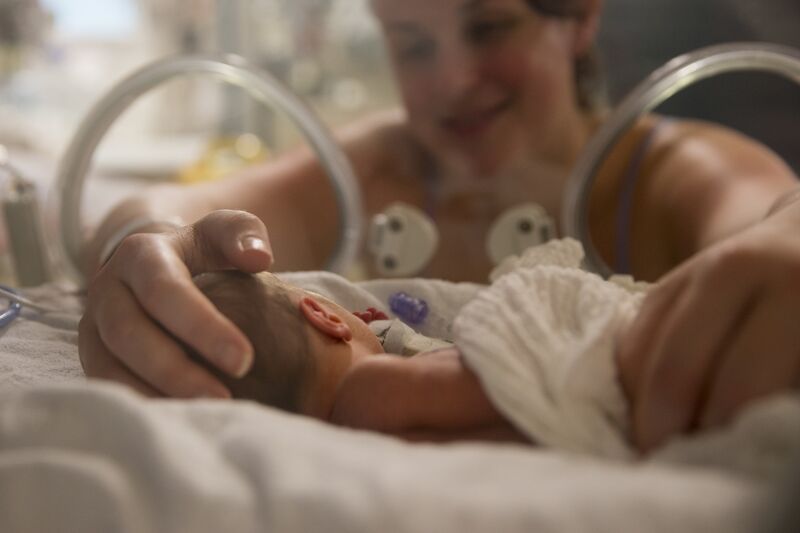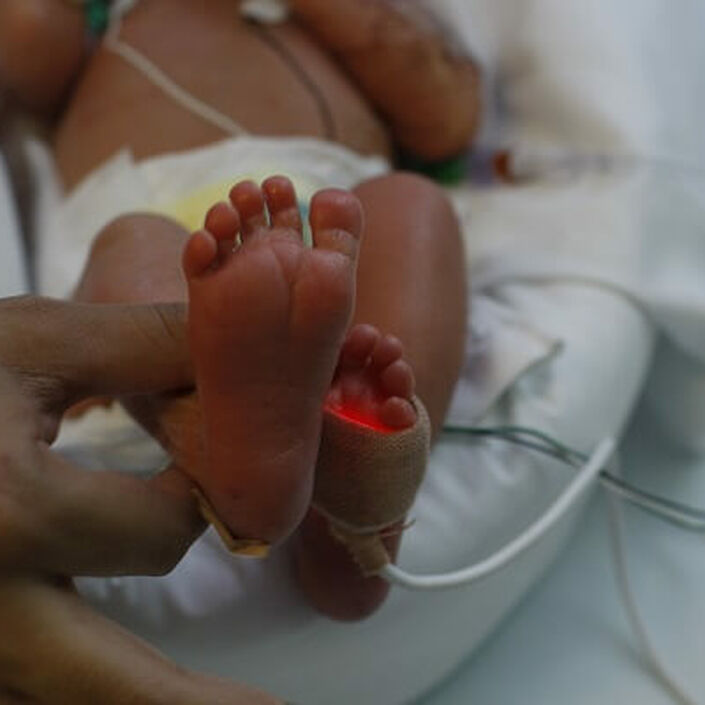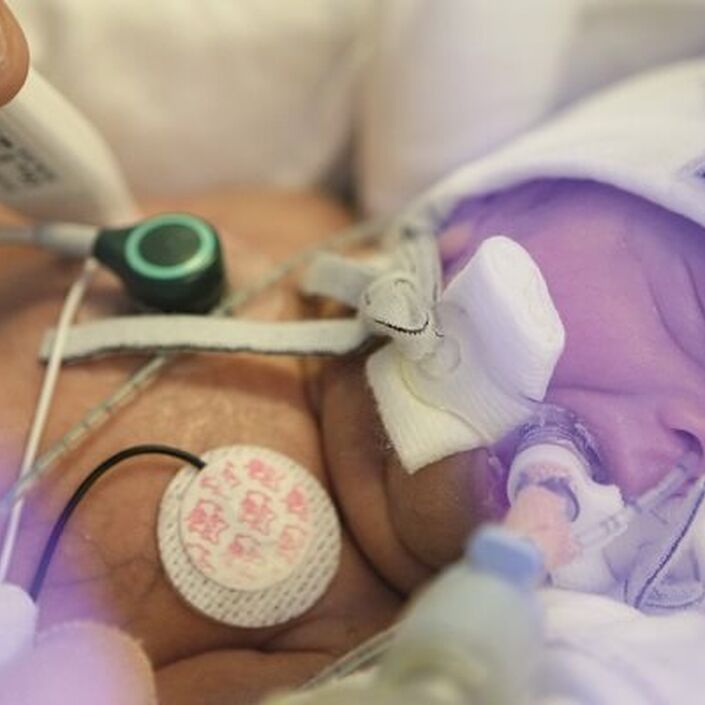POPPY family-centred care in neonatal units
Bliss was a member of the steering group for the POPPY project. This report provides a summary of research results and recommendations from the POPPY project and highlights a range of good practices in neonatal units.
It calls for all units to review and update their current provision and take steps to provide comprehensive family-centred care. The report also includes a good practice checklist for units.
Download the Poppy Family-centred care in neonatal units report (PDF).
Advanced Resuscitation of the Newborn Infant (ARNI)
Bliss teamed up with the Resuscitation Council UK to develop the Advanced Resuscitation of the Newborn Infant training course which was piloted at John Radcliffe Hospital in Oxford.
The two day course is for any health professional who might be present when a baby is born, and teaches how to expertly manage life-threatening emergencies that might happen on a neonatal unit.
Babies who might benefit from professionals being trained in this way include those who are born early, sick or with congenital abnormalities.
Since the course launched in 2013 over 120 senior doctors, nurses and nurse practitioners have been trained. In 2016 the course will be offered in even more locations.
Standardised, Concentrated, Additional Macronutrients Parenteral Nutrition Study (SCAMP)
This research looked into the nutrition given to premature babies to try and see if it could be optimised to encourage premature babies to grow quicker in the first weeks after birth.
Dr Colin Morgan, consultant neonatologist at Liverpool Women’s Hospital and the lead researcher on this study, explains: "By optimising babies' nutritional intake their heads will grow more, which can help realise the full potential of the baby’s brain and nervous system."
Bliss funded Dr Morgan to lead a two year (2009-2011) research project.
Total Parenteral Nutrition is the feeding of an individual intravenously, bypassing the usual process of eating and digestion.
Babies born at less than 29 weeks took part in the project which looked at two different types of TPN: the standard version currently used was compared to a version higher in protein, fats and glucose. Both sets of babies received this nutrition via a drip.
By comparing these two methods Dr Morgan and his team established which is best tolerated and which produces the best growth by measuring the head circumference. In addition, Dr Morgan and his team have collected lots of information about the safety of this new method.
The findings
The study's findings show a significant difference between the head circumference of a baby who received the feed with extra nutrients, compared with those that received the standard nutrients.
The difference was an increase of about 5mm, which is about 6 per cent difference in brain size at 28 days of life. These differences were still visible after the babies had gone home.
Other studies have found that there is a link between head circumference and IQ and it is also believed that this increased brain growth could prevent learning difficulties and cerebral palsy.
What next?
Dr Morgan is working with a number of units and networks to get the increased version of TPN rolled out nationally.
Neonatal Economic, Staffing and Clinical Outcomes Project (NESCOP)
This research was part funded by Bliss and looked at what effect patient volume, transfers, and nursing and medical staffing levels had on the survival and health of premature and sick babies.
The researchers looked at what effect the level of unit and amount of care a unit was providing had on babies born very premature (born before 33 weeks gestation).
The study also looked at the effect of neonatal staff levels and the amount and type of care a unit was able to provide had on the chances of survival and long term health of babies.
The research team collected information from many different sources, including the EPICure studies, unit surveys, and the information data collected by neonatal units. They were able to use this information to build a picture of what effect the number of neonatal nurses had on the survival and long term health of babies.
The findings
The research team found that a low proportion of care days during which babies were given one to one nursing in intensive care was associated with a lower chance of survival for those babies.
They also found that between 2008 and 2012, the proportion of babies getting one to one care fell from about 40 per cent to just under 36 per cent.
Similarly, the Bliss baby report: hanging in the balance found that only 14 per cent of neonatal units in England have enough nurses.
The researchers also found that the average proportion of neonatal units providing one to one care in intensive care fell from nine per cent to an average of six per cent between 2008 and 2012.
They also discovered that babies born before 33 weeks who were admitted onto a neonatal unit that provided high volumes of care had a better chance of survival. This effect was stronger for babies born before 27 weeks gestation.
Caroline Davey, Chief Executive of Bliss, said: "This research adds to a significant body of evidence that shows the importance of proper neonatal nurse staffing levels for babies’ survival, but also the distance we go to ensure that the sickest and most vulnerable babies receive the care that they deserve."
What next?
We now have more evidence that shows just how important the provision of nursing care, as outlined in the national standards, is for the sickest babies, and how vital it is for their survival.
However, the study found that further research is needed to better understand what the optimal staffing levels are for improving outcomes further, and how best to achieve this.
Benefits of oxygen saturation targeting (Boost-II)
This study looked at the effect different amounts of oxygen has on a baby's long term health.
973 babies from the UK and Ireland took part in research that looked at whether it was better for babies’ survival and long term health to have a lower level (85-89%) of oxygen in their blood or a higher level (91-95%).
Four other similar studies also took place around the world. Babies were followed up two years from their due date.
The findings
At the time the babies were discharged from hospital more babies who had a higher amount of oxygen survived.
More of them had required treatment for severe ROP (retinopathy of prematurity) but severe NEC (necrotising enterocolitis) was less common in this group of babies.
Read the full research paper for this work.
Follow up
When babies who took part in the study reached two years after their due date they were followed up.
For this part of the study researchers looked at how the babies who took part in the UK and a similar Australian study where doing.
They found that more babies who had the higher amount of oxygen in their blood survived without any disability compared to those who had the lower amounts.
Read the research paper for this follow up work.
What's next?
To find out more about the BOOST- II UK study please visit the NPEU website or email [email protected].
Bliss briefings
Bliss briefings contain information on some of the latest research happening in neonatal care. These files will all downloads as a PDF.
- The Standardised Concentrated Added Macronutrients Parenteral (SCAMP) nutrition study
- Discussion paper on the use of breast milk fortifiers in the feeding of preterm infants - Caroline King and Sue Bell
- Discussion paper on the research findings of the lived experiences of first time fathers with a preterm infant in a neonatal intensive care unit - Dr Liz Crathern
- Understanding and supporting preterm breastfeeding as optimum nutrition.
- Listening to Parents after stillbirth or death of their baby after birth.


